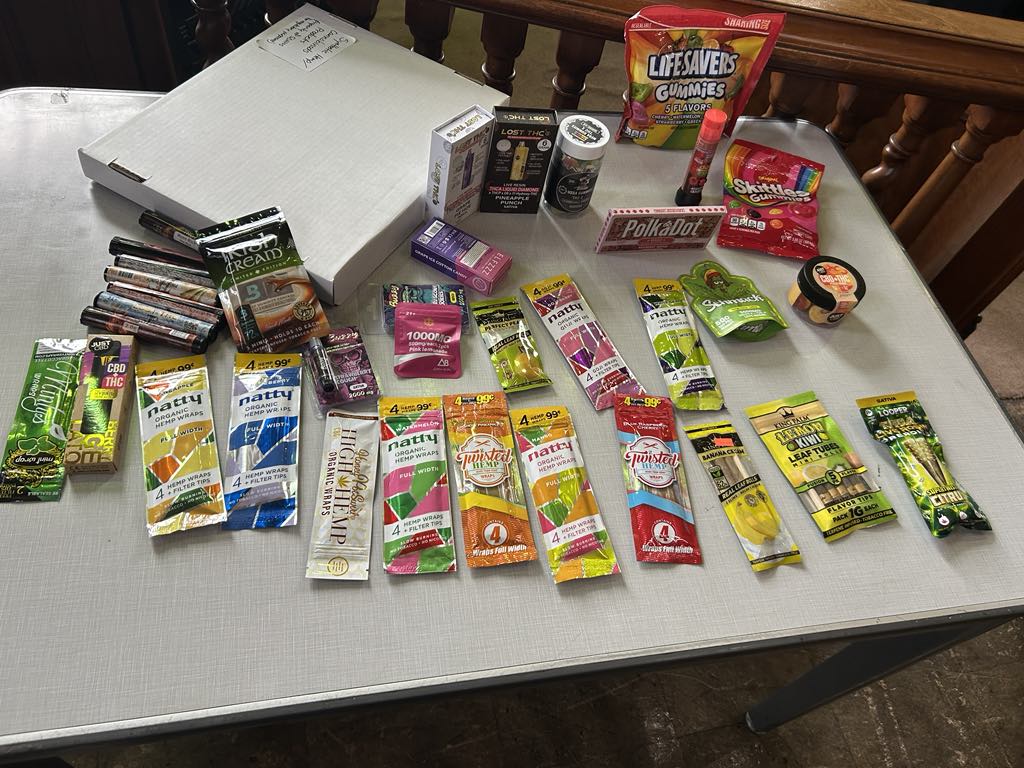Unregulated and untested THC products, known as “gas station weed,” were displayed at a June 4 press conference.
Reminder Publishing file photo
SPRINGFIELD — In a unanimous vote, the Springfield City Council approved an ordinance that effectively bans the manufacturing, selling and distribution of unregulated and untested THC products, otherwise known as “gas station weed.”
The ordinance passes the full council during its June 23 meeting after it was first introduced by Mayor Domenic Sarno at a press conference earlier this spring.
“These are really dangerous, and they are illegal,” Health and Human Services Commissioner Helen Caulton-Harris said with regard to the products. “They are impacting our youth in a way that is really not safe.”
Currently, dispensaries licensed and regulated by the Cannabis Control Commission, can sell marijuana in the state of Massachusetts. However, in recent years, consumers across the state and in the city of Springfield have been exposed to hemp-derived products with “artificially elevated levels of THC” across gas stations, bodegas, liquor stores and retail shops.
Although they carry similar effects associated with typical marijuana products, city officials say these products are more dangerous, not only because of their unregulated nature, but also because they can resemble candy or other snacks due to deceptive packaging.
At the press conference on June 4, Caulton-Harris said perpetrators are creating a stronger psychedelic effect in their products by chemically converting the delta-8 and delta-10 components found in trace amounts in THC.
An overview of synthetic cannabinoids from the Centers for Disease Control and Prevention says that these illicit products bring clinical risks like neurological agitation, confusion, seizures, stroke and suicidal thoughts, among other things.
“I believe [these drugs] are considered gateway drugs,” Caulton-Harris said at the press conference. “When our youth have access to these kinds of cannabinoids or synthetic cannabinoids, the impact for their future is something we all should take extremely serious.”
Aside from making the drugs illegal, the ordinance also authorizes police and health inspectors to confiscate the product and institute a $300 fine per item, the highest the city can implement due to state law, according to Springfield City Solicitor Stephen Buoniconti.
That equates to a $3,000 fine for 10 pieces of product and a $30,000 fine for 100 pieces, Sarno said.
Prior to the formation of this ordinance, there was nothing the city could do to stop places from selling these unregulated products, according to Buoniconti.
“There’s no description of what’s contained in the compounds of it, and anybody can walk into a store … hand money across the counter and … the teller would do nothing illegal by selling that child the product,” Buoniconti said. “That’s what we’re facing and that’s why we think we need to immediately take them off the shelves.”
Ward 1 City Councilor Maria Perez, who sponsored the ordinance with Ward 4 City Councilor Malo Brown, said the city plans to educate the gas stations and bodegas in the cities about the ramifications of selling illegal synthetic cannabinoid products now that the ordinance has passed.
Buoniconti added that notices will be sent out across the city, so people are aware of the new ordinance before Springfield executes aggressive enforcement.
At the June press conference, Caulton-Harris said there are about 12 to 13 places in Springfield that are selling these products. She shared that the city knows where they are and what products are being sold there, but did not divulge the names of the places.
The council officially approved the ordinance with little to no discussion.


